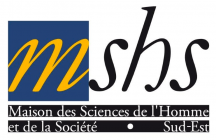Maison des Sciences de l’Homme et de la Société Sud-Est (MSHS)
Université Côte d'Azur


Description
The Maison des Sciences de l’Homme et de la Société Sud-Est (House of the Humanities and Social Sciences, Southeastern France – MSHS Sud-Est) is a CNRS Service and Research Unit (USR 3566) bringing together 14 research laboratories. MSHS Sud-Est is jointly supervised by CNRS, the Université Nice Sophia Antipolis (member of the Université Côté d’Azur) and the University of Corsica. It is also a member of the French national network of humanities houses (RnMSH).
The House of the Humanities and Social Sciences, Southeastern France (MSHS Sud-Est, Nice, France) gathers together 14 research laboratories. The centre pursues interdisciplinary studies within the Humanities and Social Sciences, structured around 5 main themes allowing for interactions among the following fields: archaeology, history, geography, sociology, psychology, economics, law and philosophy.
Role in SfaxForward
The MSHS Sud-Est researchers will contribute to Sfaxforward by nourishing reflections on commons management, environmental justice and the development of ecotourism with an interest in Heritage, during workshops (Work package "Collaborative workshops") and thematic schools (Work package "Training of young researchers"). The centre’s research team will also share its invaluable experience and feedback on managing multidisciplinary research, overseeing multidisciplinary projects and implementing new forms of scientific popularization. Finally, the centre’s administrative and technical staff will participate in Work Packages "Communication" & "Management", to share their expertise in the management of a multidisciplinary research structure, as well as data management in the Humanities and Social Sciences.
Key person
Christophe Charlier (M) is Deputy Director of the Maison des Sciences de l’Homme et de la Société - Sud-Est (USR 3566).
Research field: Environmental economics, focusing on: i) green industrial policies and their interactions with free trade, and ii) behavioural economics for environmental policies.
Jean-Charles Briquet (M) is General Secretary of the Maison des Sciences de l’Homme et de la Société Sud-Est (MSHS Sud-Est). He ensures, in collaboration with the Director, the coordination and management of the structure, notably by helping to lead and organize multidisciplinary research within the humanities and social sciences. Involved in research projects within the domain: “Territories: Construction, Uses, Powers”, his research focuses on territorial development/promotion, tourism and sustainable development.
Sylvie Rochhia (F) Executive Committee member for the Revue d’Economie Industrielle (http://rei.revues.org/).
Coordinator of studies for the Master 1 in Industrial Development (Université Côte d’Azur). Coordinator of the research project “Intrepid”, focusing on territorial development and promotion via sustainable tourism (Academy 5 – Idex UCA).
Research fields: industrial organization, the economics of knowledge, sectoral dynamics.
Her current research focuses on platforms and regional tourism. Local development is also the main focus of her interdisciplinary research on the indicators of sustainable tourism in protected areas (Intrepid).
Frédérique Bertoncello (F) is Coordinator of Research Axis no. 4 “Territories: Construction, Uses, Powers” of the Maison des Sciences de l’Homme et de la Société - Sud-Est (USR 3566).
Research fields: archaeology (Roman period), ancient settlement patterns and territorial dynamics, landscape archaeology and human-environment interactions; strong interest for interdisciplinarity and regular involvement in and/or coordination of interdisciplinary projects.
Lise Arena (F) is head of the pluridisciplinaire program: « Digital Technologies, Uses and Communities » - MSHS Sud-Est (USR 3566)
Research field: Management of Information systems with main focus on: i) the role of digital artefacts in organizations (teams, firms, industries and markets), and ii) the history of information systems and digital transformation.
Ali Douai’s (M) research field is: Ecological economics with main focus on: i) ecosystem services and institutional arrangements supporting them, and ii) biodiversity offsets and the market-based solutions supported them.
Damien Bazin’s (M) research field is: I. Economics of Environment: agricultural economics and ecological economics. Working on relation between environmental taxation and responsibility (RSE, crowding out effect). Working on problematic of indebting of Indian GMO cotton farmers (socio- economic impacts, suicides). Working on phenomenon of incertitude and irreversibility in decisions of investment of heterogeneous economic agents. Working on relation between environmental nuisance and creation of new inequalities in local communities. II. Development Economics: social and environmental durability. Working on relation between well-being, poverty and vulnerability as determinants of environmental risks. Working on reinforcements of capabilities and resilience (endogeneity of inequalities). Working on conditions of accessibility to natural resources. III. Economic Ethics: social and environmental justice. Working on economic, environmental and moral dilemmas (exclusion and interaction of altruist and responsible behaviours). Working on behaviour mechanisms (motivations) favouring altruism and cooperation toward generations and toward ecosystems. Working on heterogeneity of economic agents (identity tensions, behaviour strategies and coordination).
The Université Côte d’Azur (UCA) is a cluster gathering together the university and higher education institutions of the Côte d’Azur region. In 2016, UCA supported the UCAJEDI project, which has been selected as one of eight French Initiatives of Excellence (IDEX). UCAJEDI thus brings together all public and private entities of higher education and research present within the Côte d’Azur, which are well-known and visible on the international stage. The UCAJEDI strategy rests upon three pillars: (i) an ambitious and cutting-edge scientific vision; (ii) an uninhibited relationship with local authorities and companies, dedicated to dynamizing the territorial economy; (iii) simple, efficient governance, capable of quick decision-making. This strategy aims to engender a world-class, research-intensive university. The UCAJEDI project acts as a facilitator for five Academies of Excellence – initiating a trans-disciplinary approach – and three Reference Centres, hosting very high-level technological platforms, within a public-private partnership. At the heart of this setup, modelling, simulations and interactions will be the common denominators among advanced research projects and situated at a dedicated site: the Centre of Modelling, Simulation and Interactions (MSI). Modelled on a graduate university, UCA encompasses an initial and ongoing training offer, covering both fundamental and applied research. UCA’s ambition is to promote original and innovative doctoral programmes attracting the highest-level doctoral candidates and early-stage researchers from around the world.

